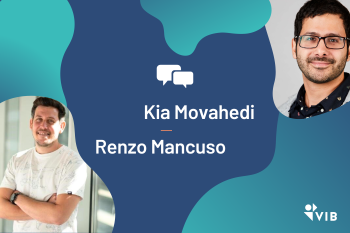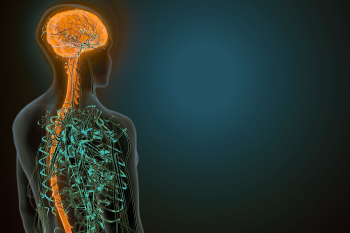Today, we have the pleasure of getting to know two exceptional researchers: Renzo Mancuso is a group leader at the VIB-UAntwerp Center for Molecular Neurology, and Kiavash, or Kia, Movahedi is Professor of Neuroimmunology at the VUB. Both are actively involved in organizing the upcoming Periphery-brain Interplay and CNS Disease conference this November and have had a fascinating journey in this field. Without further ado, let’s jump right in!
Q: Tell us about your research in periphery-brain interplay:
Renzo: “Our focus is understanding how the body’s innate immune system, the first line of defense, influences brain diseases like Alzheimer’s. While these conditions were traditionally seen as purely neurological, now it’s known they are actually heavily influenced by the immune system. Specifically, my lab explores the biology of microglia, immune cells in the brain."
Kia: “Indeed, the field of brain immunology is rapidly evolving, and we are just beginning to grasp the idea that events in the periphery can also profoundly influence the brain’s neuro-immune landscape. It’s an emerging and exciting area of study. We also focus on macrophages in the brain, which includes microglia. Macrophages are fascinating cells and the most abundant immune cell type in the brain. Understanding their role is essential for comprehending brain physiology.”
The field of brain immunology is rapidly evolving, and we are just beginning to grasp the idea that events in the periphery can also profoundly influence the brain’s neuro-immune landscape. - Kia Movahedi
Q: You work in similar fields. Do you collaborate?
Kia: “Definitely! We are very interested in Renzo’s xenotransplantation models, where human microglia are transplanted in the mouse brain, and he has helped us set these up in our lab. I think these days, collaboration is essential. It’s very rewarding to share expertise, technologies, and ideas with colleagues. Conversations with colleagues often result in new ideas popping up and lead to interesting new avenues of research.”
Renzo: “Kia and I are also applying to some big projects together. We’re really trying to join our efforts to tackle a common goal. A lot of our work cannot be done without collaborations. I really like how it can make people come together and produce something meaningful.”
I believe the next big thing is translating our knowledge of microglial states into functional insights. We want to know how to influence brain inflammation in diseases like Alzheimer’s, using what we’ve learned from transcriptional data. - Renzo Mancuso
Q: Where do you believe the next breakthrough will occur in this field?
Renzo: “I believe the next big thing is translating our knowledge of microglial states into functional insights. We want to know how to influence brain inflammation in diseases like Alzheimer’s, using what we’ve learned from transcriptional data.”
Kia: “Absolutely, Renzo! And I think there’s a big future for cell therapies for the brain. Finding ways to modulate neuro-immune signaling in brain diseases could be a game-changer too. It’s all about understanding and controlling the conversations happening in our brains.”
Q: And in 50 years from now, what could your research ultimately lead to?
Kia: “This might sound very science-fiction, but in an ideal world, we will introduce novel elements into the brain to enhance its cells, granting them new capabilities to help the aging brain remain healthy. I would love to see the fields of synthetic biology, stem cell engineering, and neuro-immunology combined.”
Renzo: “That would be amazing! I hope our research leads to strategies that delay neurodegeneration, allowing people to enjoy long, happy, and healthy lives.”
Q: Who are your scientific heroes?
Renzo: “Hugh Perry and Bart De Strooper have inspired me to do this work. Hugh introduced me to microglia during my PhD, and Bart opened doors in Alzheimer’s research. I try to blend their expertise into my lab’s work.”
Kia: “Charles Darwin is one of my biggest heroes, but this is the case for many biologists. Pío del Río Hortega is a much more underrated hero of mine. He discovered microglia more than a century ago!”
Q: As a child, could you have imagined doing research?
Renzo: “Not at all! I grew up in Argentina, wanting to be a professional volleyball player. Life took a different path when my family moved to Europe. This allowed me to become a researcher. I did keep playing volleyball until my postdoc years when I broke my Achilles tendon.”
Kia: “Awtch! I’m glad my goals were never in sports [laughs]. I always knew I wanted to do science! I’m very happy I found a topic I really love. I can look at two of the most complex systems in the body and how they interact. I’m really happy with how things worked out.”
Q: If you had the chance to ask an omniscient higher being one scientific question, what would it be and why?
Kia: “I’d ask about the nature of matter or the fabric of the universe, but will I understand the answer? I doubt our brains could fathom it, let alone know what to do with it!”
Renzo: “I’d just ask for tomorrow’s winning lottery numbers so I can fund my lab endlessly! [laughs]”
Thank you for your insights! I’m looking forward to seeing both of you again at Periphery-brain Interplay and CNS Disease.
For more information about the conference, visit the meeting website.
The registration deadline for this event is 27 October.

